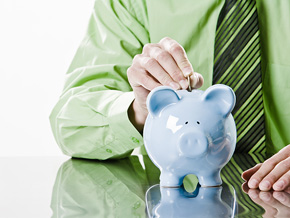There is seemingly little incentive to save in this economy. The markets are down, up and then down again, a never-ending roller coaster that has investors biting their nails. Interest rates on safe vehicles like CDs, savings accounts and money markets are yielding little more than 1.5 percent, and that's if you're lucky. And, by the end of the month, do people have any money left over to put in those vehicles anyway?
Apparently so. Although both of those truths would lead you to believe that the savings rate, dismal before the recession, is even worse now, that's not at all the case. In fact, it clocked in at 5.2 percent in the second quarter of this year, up from 1.5 percent in the fourth quarter of 2007, according to the Bureau of Economic Analysis.

Photo: Thinkstock
What does that mean? It means that while we've lost a lot in this recession—college and retirement savings, emergency funds—we're now on a quest to salvage what remains. Here, tips to help you do just that:
Save More
Clearly, as a country, we're starting to get the message: Saving more money is the absolute best way to recover from losses in your portfolio. When you ratchet up your savings efforts, you're automatically closer to your goals, no matter what they are or what the market decides to do next.
If you're young, saving more just means stashing extra money away, either by cutting your expenses further or doing a little overtime or part-time work on the side to earn some more dollars. If you're closer to retirement age, it means working longer, says Greg Karp, author of The 1-2-3 Money Plan: The Three Most Important Steps to Saving and Spending Smart . "You shouldn't take more risk hoping to hit the goal number. Working just a year or two longer could dramatically affect how much money you have at retirement. " It works in two ways, actually: One, it allows you to continue putting money away for a longer period of time, and two, it allows your money to grow, untouched, for an extra year or two. Combined, these can help bring you back up to speed.
Make It Automatic
At some point, we're going to come out of this recession. You'll have more money in your wallet, and your urge to spend may rear its ugly head. After all, you've been good for so long, cutting back on the extras, bargain shopping for the essentials and walking by sale after sale. It's natural to feel a little deprived, and it's okay to buy yourself something if you can afford it. But if, right now, you set up your savings contributions so they're automatically pulled out of your check each pay period, or out of your bank account once a month, you'll have a much easier time hanging on to the good habits you've developed, says Nancy Dunnan, author of Recession-Proof Your Financial Life . You'll wiggle your extra spending money out of your bank account balance after you've made savings contributions, not before, meaning a new pair of shoes won't cut into your long-term goals.
Don't chase the next big thing. When you've lost money in the market, or spent down your emergency fund, the temptation is to try to bring those balances back up as fast as possible. But that's not the smartest way to go about this, Karp says. "You shouldn't invest in something you don't understand because of the promise of big returns. We're going to see a lot of that now—people taking inordinate risk because they have the desire to get even." If you were doing things right in the first place—allocating your investments for your age and risk tolerance, diversifying to protect yourself, keeping your short-term money liquid—then you really don't need to make any changes now. The market will bounce back on its own, and your thoughtfully invested money will be right there with it.
One tool I like—and you've probably heard this from me before—are target date retirement funds. You select a fund for your money that matches the year closest to when you plan to retire, and it automatically rebalances as you near that date. That way, you don't have to micromanage your long-term investments.
Pay Down Debt
Not, I repeat, not, if it will leave you without a cash cushion. In a bad economy, that's a risk you don't want to take: You could clean out your savings account to pay off your credit card, and in turn, your credit card company could close your account, leaving you with nothing to fall back on in an emergency. But if you have a healthy emergency fund, and money to spare, consider putting it toward your high-interest rate debt, which is a guaranteed return on your investment equal to whatever your interest rate is. "If you're in your 40s and 50s, one goal should be to pay off your mortgage," Dunnan says. "If you can do that, when you reach retirement, that's one less payment you have." One less payment is one less strain on your retirement savings.
Another bonus of doing this is that you'll free up some money each month that used to go toward debt repayment. You can then use that to boost your savings even more.
Prioritize
If you only have a little money to sock away, start with an emergency fund. Once you have about six months of expenses in a liquid savings or money market account, you can move on to your retirement goals. If your employer still matches contributions to its plan, contribute at least enough to grab those free dollars—then you can consider a Roth IRA. Saving for your children's college tuition comes last. There is plenty of financial assistance available for college.
Follow Jean on Twitter @JeanChatzky
Read More Personal Finance Articles

No comments:
Post a Comment